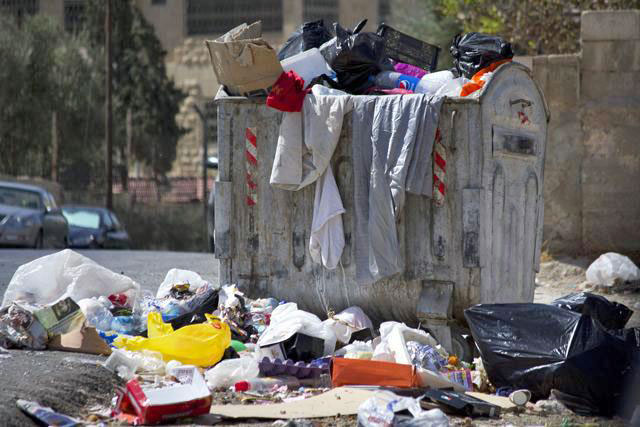AMMAN — Oxfam and the German Agency for International Cooperation (GIZ) on Monday launched a country-wide report on recycling and solid waste management, with the aim of setting the scene for the upcoming sustainable solid waste management (SWM) system in the Kingdom.
The launch event was attended by Greater Amman Municipality officials, government representatives, donor agencies and international and non-governmental organisations.
The “Country-wide Recycling in Jordan” report, carried out by IPSOS Group, a global market research and a consulting firm, surveyed a sample of 1,000 Jordanians from across the Kingdom usnig quantitative and qualitative methodologies in order to outline and address societal behaviours linked to recycling and SWM in Jordan, Managing Director of IPSOS in Jordan and Iraq Saif Nimry said during the event.
In particular, the report sought to determine awareness levels around SWM and recycling, decide whether national education levels and socioeconomic status affect recycling and reuse opportunities and understand enablers and motivators for encouraging sustainable recycling.
“Face to face interviews have been conducted in all 12 governorates, which met standards and ensured that the outcome of the report is established on the most senior levels,” Nimry added.
He noted a lack of environmental awareness, as demonstrated by the 40 per cent of Jordanians who do not know where the waste is gathered, and the other 60 per cent of citizens who have only “shallow” knowledge of recycling in the Kingdom.
Additionally, less than 17.7 per cent of people in Jordan recycle on a regular basis, and only around 3.8 per cent recycle on a daily basis, Nimry said, noting that these few citizens do so in order to save money and not for environmental motives.
He highlighted, however that during in-depth analysis of the information and perspectives given by study participants, the researchers realised that 72.4 per cent of Jordanians, based on the sample, are willing to recycle and reuse their belongings.
The Kingdom’s “fragile economic environment” is one of the main reasons behind the relatively low priority given to ecological awareness in Jordanian households, Nimry said, adding that even with the presence of a cohesive and responsive approach from “very small numbers of citizens”, those making an effort are hindered by trying to keep up with ever-changing socio-economic conditions and covering expenses.
“Recycling is crucial for the whole world, because climate change knows no boundaries; neither does it recognise nation states nor the airspace of a country. Everything we do across the world is affecting us all together, because we all live on the same planet,” Oxfam Country Director Nickie Monga told The Jordan Times at the event.
“Through this event, we want to provide an insight on the latest conclusions of this report commissioned by Oxfam, with the aim of providing a full spectrum of support for the future of recycling and SWM,” Nimry said during the launch event.
The report is just one of the initiatives Oxfam in Jordan is embarking upon as part of the larger “Betak Beitak” campaign, which aims to remind people that their environment is their home, with the aim of increasing levels of environmental literacy across the country and expanding on successful pilot projects that address socioeconomic challenges, Monga said. Oxfam has been working in Jordan since 1990 with the aim of providing essential humanitarian assistance to all people, tackling inequality and standing up to challenges, Monga added.
Chief among the organisation's initiatives is a "first-of-its-kind website" that helps connect visitors across the country with litter and recycling information as well as nearby local resources, facilities and services.
